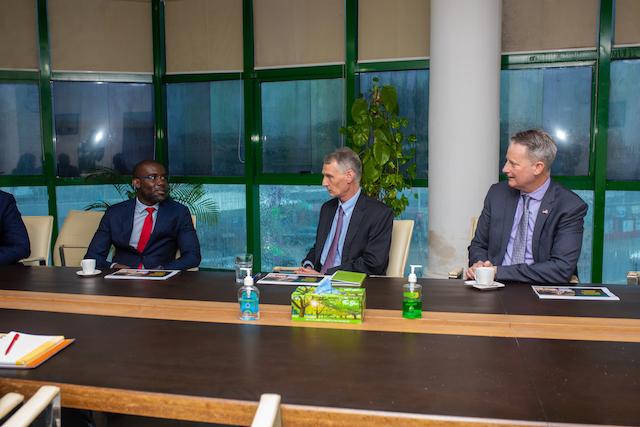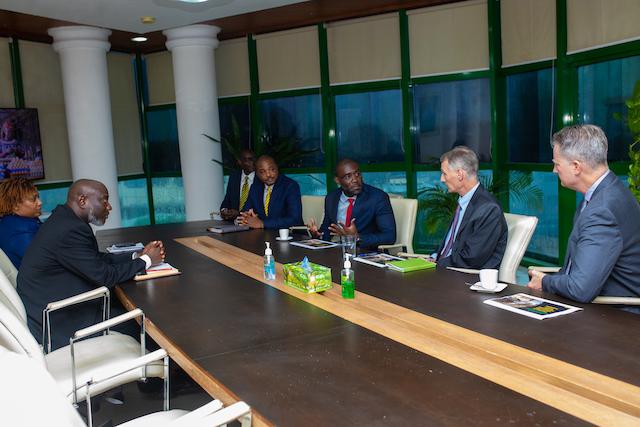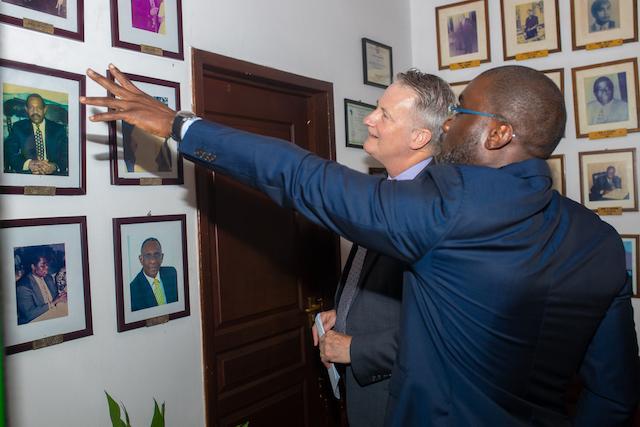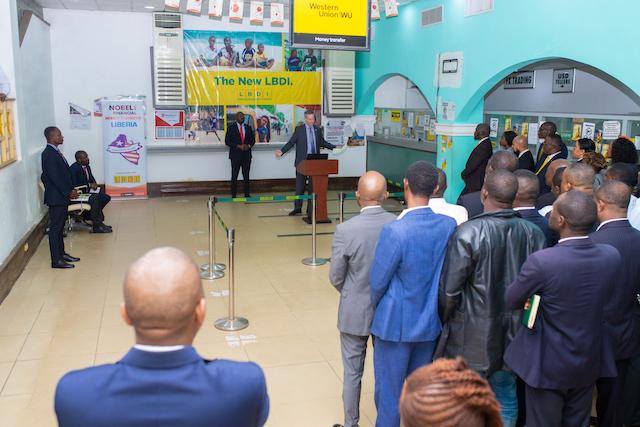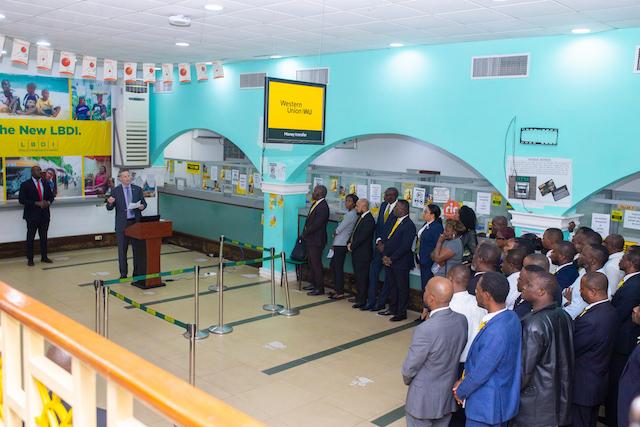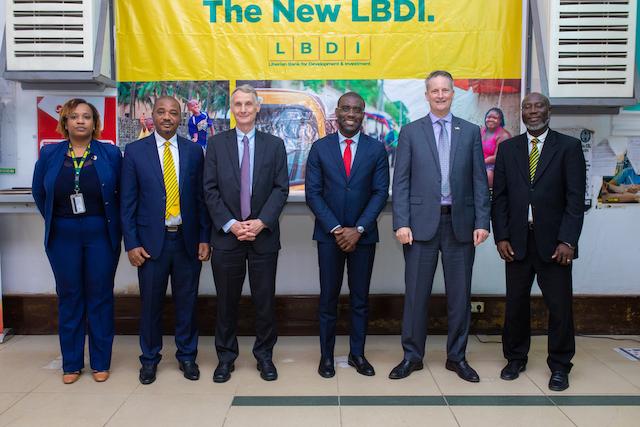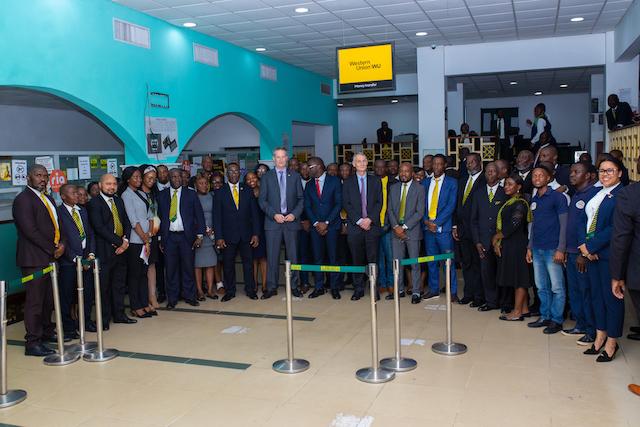“It Will Take Significant Foreign Investment to Change Liberia’s Economic Outlook”
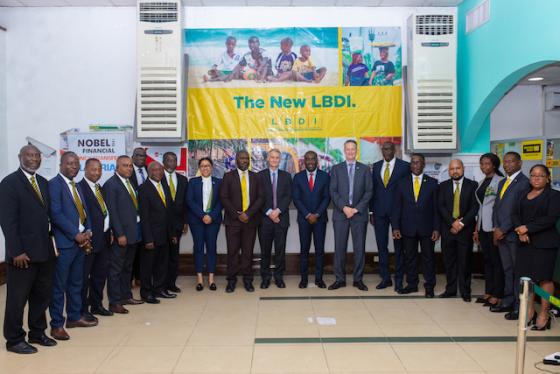
(From center) LBDI's president Deo Delaney and US Ambassador Michael McCarthy, along with the banks top management.
— Says U.S. Ambassador, during visit to LBDI
The United States Ambassador to Liberia, Michael A. McCarthy, said it will take significant foreign investment to change the economic outlook in Liberia, and LBDI could play a leading role in attracting new investors.
The U.S. Ambassador made the statement on Tuesday, September 6, when he paid a courtesy visit to Deo Delaney, the new President and CEO of the Liberian Bank for Development and Investment (LBDI).
“LBDI could be the beginning of turning the corner and changing the environment,” McCarthy said. “You could be the ones who begin to attract foreign investors. And that is critical.
“It makes us excited that we have a partner in the economy who has one of the same goals that we have. We’re convinced that with the new team and the new outlook, you’re going to do great things.”
Delaney thanked the U.S Ambassador for his vote of confidence and for visiting the bank.
“I cannot overstate how much it means to us to have Ambassador McCarthy visit with us today at LBDI. Please join me in welcoming him and the head of USAID, Jim Wright,” Delaney told staffers gathered in the banking hall at LBDI’s headquarters on 9th Street, Sinkor, Monrovia.
In April, LBDI’s Board of Directors hired Delaney, 37, to lead Liberia’s only development finance institution.
During his hour-long visit, McCarthy initially met with Delaney and LBDI’s senior executive team before taking a tour of the bank’s headquarters.
Besides Delaney, LBDI’s three other executive officers are Mark Akwenah Nyeamene, Deputy CEO and General Manager; Regina Elliott, Corporate Secretary; and J. Wilbert Thomas II, Acting CFO and Comptroller.
In a 10-minute speech to the bank’s staff, McCarthy said: “It’s wonderful to see LBDI re-embrace” its role as a development bank.
“Because that’s what this country needs for long-term development. A part of attracting those investors is creating greater trust in the financial markets in Liberia,” said McCarthy. “When you improve your governance structures, and digitize, and make it more standardized to outsiders, you’re making this a more favorable environment.”
McCarthy says he finds LBDI’s desire to be involved in climate finance especially exciting.
Climate finance is really important for all of us around the world. “If you can get financial benefits for the resources you have, you are not only helping the world, but you are also helping Liberia as well,” he said.
Delaney says as he works to reorganize the bank and reset priorities, the visit from McCarthy, who he called a friend, is “not just symbolic.”
“Now that the Government of Liberia has named LBDI a key driver of economic growth in Liberia, we hope the Ambassador’s presence here at our bank is the first phase of an enduring relationship that will be strengthened by LBDI’s renewed commitment to transparency, good corporate governance, accountability, and all the interests we have in common,” Delaney added.
LBDI, the country’s largest and only development finance institution, was created by an Act of the National Legislature in 1961.
Since 1988, it has also acted as a commercial bank.
The bank was established by the Liberian government and several foreign development companies to help develop the financial infrastructure in Liberia.
LBDI was established under the joint initiative of the Liberian government and major international financial institutions who purchased equity in the Bank.
LBDI is predominantly a privately owned institution under private management and a Board of Directors elected annually by its shareholders. The bank commenced operations in 1965 as the Liberian Bank for Industrial Development and Investment. Under an amendment in 1974, the name was changed to the Liberian Bank for Development and Investment.

